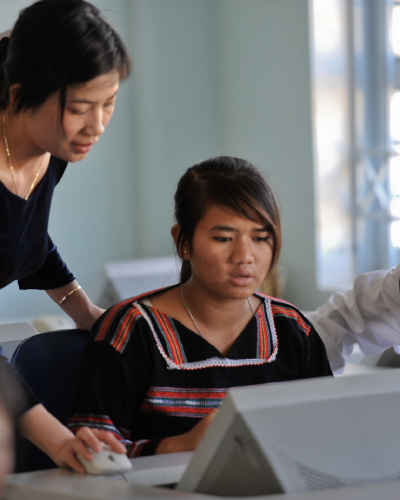Boosting youth jobs is an important goal for Asia and the Pacific countries. ADB, Ireland, and the Republic of Korea are partnering to help enhance youth employability and productivity by engaging with civil society and youth organizations to develop demonstration projects, increase youth skills, and expand regional employment opportunities.
Listen to the story
the youth dilemma: unemployment
For millions of young people in developing member countries, securing a stable job remains out of reach. Despite their ambitions, many face a tough reality—a mismatch between their skills and the needs of modern industries. Many lack access to quality education and vocational training, and rapidly evolving sectors like information and communication technology or ICT require constant upskilling. Without the right training, youth are left ill-prepared for the job market.
The numbers for Asia and the Pacific are stark. Youth in the region are nearly five times more likely to be unemployed than adults. In 2019, the youth unemployment rate stood at 13.8% compared to 3% for adults. Many who are employed work in the informal sector, where low wages and poor working conditions are common. Before the COVID-19 pandemic, 84% of youth had no access to social protection. Also, over 160 million young people were not in employment, education, or training (NEET), with South Asia experiencing the highest NEET rate at 30%.
The situation is even tougher for young women, who account for nearly three-quarters of the region’s NEET population.
Youth from marginalized communities—including rural communities and persons with disabilities—face even greater employment barriers, from discriminatory hiring practices to limited access to resources and networks. Many young people with entrepreneurial dreams struggle to get started, hindered by a lack of mentorship, financial support, and networks needed to transform their ideas into successful ventures.
addressing youth employment
In response to these challenges, the ADB, Ireland, and the Republic of Korea joined forces to demonstrate how innovative employment solutions can help create job opportunities for young people in the region. The technical assistance (TA) project spans a diverse group of developing member countries, including Cambodia, Indonesia, Kiribati, Maldives, the Marshall Islands, Mongolia, Nepal, Papua New Guinea, People’s Republic of China, Solomon Islands, the Philippines, and Tuvalu.
Central to the project are the demonstration initiatives developed with local youth organizations and civil society partners. These projects respond to regional needs and offer practical, scalable models for improving youth employability. In Indonesia, the TA supported a non-government organization to engage youth in conducting a study that supported the government’s JobStart program. This program offered essential skills training and internships, helping young people transition smoothly into the workforce. In the Philippines, the TA complemented another government program that offered community-based employment hubs which provided career counseling and job placement services, connecting job seekers with potential employers.
The project organized workshops, training sessions, and mentorship programs covering technical skills like coding and digital marketing. Beyond technical training, the project also offered soft skills like communication and teamwork, as well as entrepreneurial skills such as business planning and financial management. By fostering partnerships with local businesses, government bodies, and other stakeholders, the project facilitated access to employment opportunities and cultivated a dynamic and supportive employment ecosystem where young people can thrive.
impactful results for youth development
The project has significantly impacted youth employment across various developing member countries. In the Philippines, the JobStart program achieved a 67% placement rate for its participants. Meanwhile in Indonesia, at least 21 youth ambassadors were trained in using participatory social assessment tools to measure various dimensions of poverty and vulnerability.
Progress was also made through the ASEAN plan for Youth Employment Solutions (YES) program, which successfully designed three demonstration projects. The clear focus on skills enhancement saw young participants enrolled in JobStart training programs and youth leaders and civil society staff participating in meaningful youth engagement training. These skill sets have been integrated into five ADB operations projects, further expanding the reach and sustainability of the initiative.
The expansion of YES has benefited thousands of individuals through knowledge-sharing events and capacity-building activities. Innovative youth participation has been a cornerstone of the project, with 35 initiatives incorporating youth components and two research publications produced on the impact of COVID-19 on youth employment.
“Too many young people across Asia and the Pacific have poor job prospects. There is a real youth skills and training gap. With this project, ADB and partners are helping to upskill young people for today’s jobs by working with civil society and community organizations as well as employers to develop real practical skills and job training."

looking ahead: a brighter future for asia and the pacific's youth
The regional technical assistance project is more than just an employment initiative—it is a step toward unlocking the full potential of the region’s young generation. By equipping our youth with the tools, knowledge, and opportunities they need, ADB and its partners are helping build a workforce that is not only prepared for the challenges of today but also poised to lead tomorrow.

